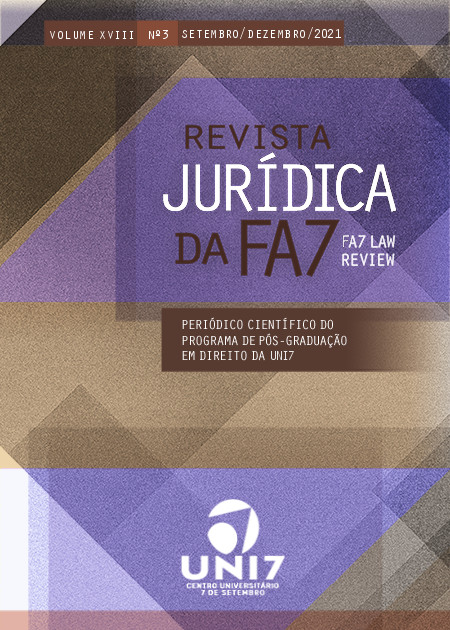O MEIO AMBIENTE COMO DIREITO HUMANO FUNDAMENTAL
DOI:
https://doi.org/10.24067/rjfa7;18.2:1275Palavras-chave:
Meio ambiente, Direitos fundamentais, Meio ambiente como direito fundamentalResumo
A Carta Magna de 1988 elevou o meio ambiente à categoria de direito fundamental, ao dispor, expressamente, sobre a responsabilidade intergeracional por sua preservação em seu art. 225. É sabido que o reconhecimento de um direito como humano como tal importa na atribuição de um grau maior de relevância dentro da esfera de valores jurídicos, passando o mesmo a gozar de mais respaldo e instrumentalidade para se fazer valer. Em um mundo onde a cada dia os problemas ambientais são em maior número e em maior gravidade, é muito importante que o direito ao meio ambiente ecologicamente equilibrado, que decorre diretamente do sobreprincípio da dignidade da pessoa humana, seja considerado dessa forma, sob pena de que não se concretizem os ditames constitucionais sobre a proteção do meio ambiente. Neste sentido, o presente artigo tem o objetivo de analisar a importância da tutela jurídica do meio ambiente enquanto direito humano fundamental, bem como as consequências disto, tanto para o Estado, como para a população, através da análise de documentos nacionais e internacionais e da jurisprudência de tribunais superiores sobre o assunto, sendo, portanto, uma pesquisa bibliográfica e documental. Tratando-se de um direito cuja proteção é indispensável à manutenção da vida humana para as gerações atuais e futuras, a higidez do meio ambiente possui caráter inalienável e irrenunciável, e somente sua observância tem o condão de permitir a manutenção da vida humana digna em um planeta que, a cada dia, sofre mais com os efeitos nefastos da ação antropocêntrica e utilitarista frente à natureza.
Referências
ANTUNES, Paulo de Bessa. Direito Ambiental. 16. ed. São Paulo: Atlas, 2014.
BASTOS, Celso Ribeiro. Curso de direito constitucional. São Paulo: Saraiva, 2001.
BENJAMIN, Antônio Herman. Constitucionalização do ambiente e ecologização da Constituição brasileira. In: CANOTILHO, José Joaquim Gomes; LEITE, José Rubens Morato. Direito Constitucional Ambiental Brasileiro. 3. ed. São Paulo: Saraiva, 2010.
BOBBIO, Norberto. A era dos direitos. Rio de Janeiro: Campus, 1992.
BONAVIDES, Paulo. Curso de direito constitucional. 14. ed. São Paulo: Malheiros, 2004.
BONAVIDES, Paulo. Curso de direito constitucional. 18. ed. São Paulo: Malheiros, 2006.
COMPARATO, Fábio Konder. A afirmação histórica dos direitos humanos. São Paulo: Saraiva, 2003.
CRISTÓVAM, José Sérgio da Silva. Colisões entre princípios constitucionais: uma abordagem a partir da teoria de Robert Alexy. Disponível em: http://dominiopublico.mec.gov.br/download/teste/arqs/cp032730.pdf. Acesso em: 22 mai. 2021.
DERANI, Cristiane. Direito ambiental econômico. 2. ed. São Paulo: Max Limonad, 2001.
FERREIRA FILHO, Manoel Gonçalves. Direitos humanos fundamentais. São Paulo: Saraiva, 1995.
GSCHWENDTNER, Loacir. Direitos Fundamentais. Jus Navigandi, Teresina, a. 5, n. 51, outubro de 2001. Disponível em: http://www1.jus.com.br. Acesso em: 02 nov. 2004.
GUERRA FILHO, Willys Santiago. Dimensões dos direitos fundamentais. Revista do Instituto dos Advogados de Pernambuco, V. 1, n. 1. Recife: Instituto dos Advogados de Pernambuco, 1996.
LEITE, José Rubens Morato. Dano Ambiental: do individual ao coletivo extrapatrimonial. 2. ed. São Paulo: Revista dos Tribunais, 2003.
MACHADO, Paulo Affonso Leme. Direito Ambiental Brasileiro. São Paulo: Malheiros, 2016.
MORAES, Alexandre de. Direitos humanos fundamentais. São Paulo: Atlas, 1997.
ORGANIZAÇÃO DAS NAÇÕES UNIDAS. Declaração do Milênio das Nações Unidas. Nova Iorque, 2002.
REALE, Miguel. Memórias. v. 1. São Paulo: Saraiva, 1987.
SALGE JR., Durval. Instituição do bem ambiental no Brasil pela Constituição Federal de 1988: seus reflexos ante os bens da União. São Paulo: Juarez de Oliveira, 2003.
SARLET, Ingo Wolfgang; FENSTERSEIFER, Tiago. STJ, a dimensão ecológica da dignidade e direitos do animal não humano. Disponível em: https://www.conjur.com.br/2019-mai-10/direitos-fundamentais-stj-dimensao-ecologica-dignidade-direitos-animal-nao-humano. Acesso em: 26 mai. 2021.
SILVA, José Afonso da. Direito constitucional ambiental. 4. ed. São Paulo: Forense, 1995.
SILVA, José Afonso da. Curso de direito constitucional positivo. 20. ed. São Paulo: Malheiros, 2001.
SIRVINSKAS, Luís Paulo. Manual de Direito Ambiental. São Paulo: Saraiva, 2018.
TRINDADE, Antonio Augusto Cançado. Direitos humanos e meio-ambiente: paralelo dos sistemas de proteção ambiental. Porto Alegre: Sergio Antonio Fabris, 1993.
Publicado
Como Citar
Edição
Seção
Licença
O(s) autor(es) declara(m) que
a) a contribuição é original e inédita e que não está em processo de avaliação em outra revista;
b) são integralmente responsáveis pelas opiniões, ideias e conceitos emitidos nos textos;
c) autorizam aos editores da RJFA7 a proceder ajustes textuais e de adequação do artigo às normas da publicação;
d) em caso de aceitação, a RJFA7 detém o direito de primeira publicação, sob licença CreativeCommons Atribuição-NãoComercial-CompartilhaIgual 4.0 Internacional.
Os autores permanecem com os direitos autorais, sendo permitida a reprodução, no todo ou em parte, com o necessário reconhecimento da publicação inicial, seja para distribuição exclusiva, seja para distribuição online, para propósito não comercial, garantindo-se as mesmas regras de licença.
Authors declare that
a) the contribution is original and unpublished and that it is not in the process of being evaluated in another journal,
b) they are fully responsible for the opinions, ideas and concepts emitted in the texts;
c) authorize the editors of FA7LR to make textual adjustments and adequacy of the article to the norms of publication;
d) in case of acceptance, FA7LR holds the right of first publication, under CreativeCommons Attribution-NonCommercial-Share-Alike 4.0 International license.
The authors remain with the reproduction, in whole or in part, with the necessary recognition of the initial publication, either for exclusive distribution or for online distribution, for non-commercial purposes, and the same license rules are guaranteed.









